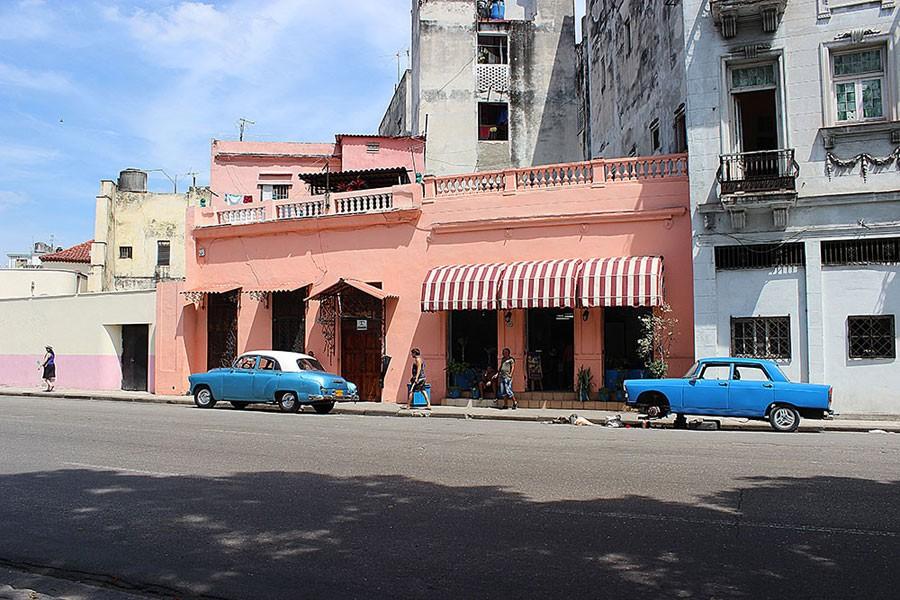Class to visit Cuba
Antique cars are everywhere in Havana, Cuba
This Spring JSC will offer a class called “The Art and Culture of Cuba” which will include a week-long trip to Cuba, one of the last remaining socialist states governed by a Marxist-Leninist Communist party.
The trip, which will run during the February break is capped at 16 and interested students must interview for the class.
The course fee is expected to be similar to previous trip, which was $1800.
Ken Leslie is a professor of fine arts at JSC who, along with Associate Professor of Writing and Literature Tyrone Shaw, has lead several trips to Cuba in the past. “This is the third time we’ve taken the students for this particular course,” says Leslie. “We’ve always done it legally, but it used to be that only if you were part of an educational group was it legal to go to Cuba. The US forbade it. That’s just beginning to change this year.”
2015 will go down in history as the year that relations between the United States and Cuba returned to some level of normalcy. On May 29 the US officially dropped Cuba from its list of state sponsors of terrorism, and on July 20 the two countries re-opened their respective embassies, restoring official diplomatic relations for the first time in more than 50 years.
The US and Cuba have had and icy relationship ever since 1960, when the Cuban government nationalized US business interests present on the island without compensation. In 1961 the US severed its diplomatic ties with the nation and famously failed to overthrow the Cuban government via a CIA-backed paramilitary operation known as the “Bay of Pigs Invasion”.
Shaw has been traveling to Cuba since the fall of the Soviet Union and the February visit will mark his 12th visit to the island republic. “I have been traveling to Cuba since 1991,” says Shaw, “just after the collapse of the Soviet Union, Cuba’s primary benefactor. I was sent to Havana on a magazine assignment to explore the incredible inventory of antique cars still rattling along the city streets.”
Shaw fell in love with Havana during that trip, making friends who have remained part of his life for more than 20 years.
He has been taking JSC students to Cuba for over a decade. “The first JSC Cuba trip was in 2001,” said Shaw, “just before President George W. Bush tightened travel restrictions to the island, restrictions that had eased under President Clinton. It was a small group: two journalism students, a dance student, and one political science student. That trip was not attached to any particular class unlike The Art and Culture of Cuba, which began in 2012. Of course, we all had a great time, including attending a conference of international combat journalists. Fascinating. We were the only Americans there.”
According to Leslie, the benefits of travel go beyond just seeing a new place. “Every time you leave your country you learn two things,” says Leslie. “You learn about the country you went to and you learn about the country you left, because a lot of things about here that you take for granted you don’t realize are unusual until you go somewhere else.”
The Art and Culture of Cuba course isn’t about being a tourist, of course. “We pack the days that we’re there with all kinds of activities,” says Leslie. “Museums, an alligator farm, adventures in everything we can think of. Each student in the course will pick a field of study – whether it be writing or art or music or performance or anthropology research or whatever their field of interest is – and they’re going to work with us before we go on the trip to figure out a project they’re going to do related to Cuba when they get back. That’s the major work of the course. There’s also a certain amount of reading to get ready for it, we watch a lot of films, listen to music, eat food that will get us ready for it so that we’re really ready for the experience. We’ve done it enough times that we know what we’re doing.”
Shaw thinks Cuba is stuffed to bursting with educational opportunity, and that in some ways this trip represents a last chance to see Cuba without the influence of a dramatic influx of American tourists. “First,” says Shaw, “travel is perhaps the greatest teacher, and I would hope that our students come away with impressions and lessons that speak personally to them. Generally, they will have, I suspect, a new appreciation for cultural and political differences, and, maybe, a greater awareness of the criminal stupidity of American foreign policy towards Cuba for more than a half-century. The re-opening of the American embassy is a hugely positive sign to me toward correcting that mistake. This trip may well be the last time any of us can experience Cuba without the expected tourist invasion of Americans on cruise ships, on booze cruises, whatever. I hate to think of Havana being infested with roving bands of loud, puking American frat boys. God save the Cubans!”
For Leslie, much of the joy of these trips comes from interacting with the average Cuban citizen. “The Cubans on the street love Americans,” says Leslie. “They’re very – when they find out you’re an American, they love it. They listen to our music illegally. They can tune in their radios, they get pirated films, they’re very aware of everything we’re doing here and totally into it. Our government, they haven’t liked of course. And that’s mutual, right? We haven’t liked theirs.”
According to Shaw, a budget for the trip should be approved within the next couple of weeks, after which the application process can begin.
Kayla served as a general assignment reporter and photographer for the spring 2013 semester. She returned for the Fall 2013 and spring 2014 semesters...




